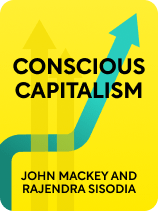

This article is an excerpt from the Shortform book guide to "Conscious Capitalism" by John Mackey and Rajendra Sisodia. Shortform has the world's best summaries and analyses of books you should be reading.
Like this article? Sign up for a free trial here.
Why should you prioritize people over profit? How has Whole Foods Market thrived off this concept?
Consciously capitalist companies (CCCs) succeed because making money isn’t the main focus. What’s most important is satisfying people and transforming the world.
Learn why people over profit always wins, according to Conscious Capitalism by John Mackey and Rajendra Sisodia.
Prioritize a Good Cause Over Profits
Mackey and Sisodia argue that all CCCs exist for a good cause—they prioritize people over profit by making the world a better place in a particular way. For example, the authors explain that Whole Foods Market’s good cause is to promote nutritious eating and environmentally friendly agricultural practices. A good cause is especially important for employees: The authors argue that employees who don’t believe in the company’s cause—or who see that there is no cause beyond making money—won’t perform as well at work (which ultimately harms the company) and won’t be happy in their own lives.
The authors say there are four kinds of good causes—helping others (for example, by providing medical care), maximizing knowledge (for example, by performing research), promoting art (for example, by creating stylish clothing), and transforming the world (for example, by building the first AI). Founders usually already know the company’s cause when they establish a company. But if a company’s cause is unclear, Mackey and Sisodia recommend assembling a group of representatives from each interested party, from investors to environmentalists, to discuss and explicitly define the company’s cause.
| Good Causes: Don’t Just Talk the Talk—Walk the Walk, Too In Servant Leadership, businessman Robert Greenleaf argues similarly that businesses have a moral duty to contribute to the greater social good. According to Greenleaf, the purpose of any institution is to meet the needs of the people it serves. He says that American businesses have largely failed on this front, but they’re uniquely poised to do better because they must respond to market demands (including demands for ethical business practices) to remain profitable. Many businesses have responded to these demands by taking stances on social issues and promising to be accountable for their social impact. However, some research suggests that there’s often a gap between a company’s desire to work toward a good cause and its actual performance with regard to that good cause. This may be the case for Whole Foods Market—its stated good cause is to promote good nutrition and environmentalism, but some evidence suggests it falls short of that goal at times. For example, one nutritional claim Whole Foods makes is that its beef doesn’t contain antibiotics, but a 2022 lawsuit alleges otherwise. To ensure your business actually follows through with its moral duty to contribute to the greater social good (rather than just aspiring to), Greenleaf recommends that you collect opinions from all interested parties about your company’s social impact and implement a plan for improvement. Other experts note that this assessment should come from key strategists within the company, instead of being assigned to outside consultants or underqualified, low-ranking employees. In addition to targeting a greater good, research suggests that reducing the gap between your company’s values and its enactment of those values may be key to employee satisfaction—employees generally find work more meaningful and, in turn, become more productive when the companies they work for practice what they preach. |

———End of Preview———
Like what you just read? Read the rest of the world's best book summary and analysis of John Mackey and Rajendra Sisodia's "Conscious Capitalism" at Shortform.
Here's what you'll find in our full Conscious Capitalism summary:
- That capitalism is inherently good for people, but we're doing it wrong
- How conscious capitalism benefits both consumers and businesses
- How to meet the interests of all parties without sacrificing anyone's needs






